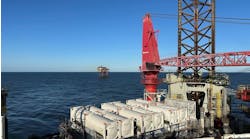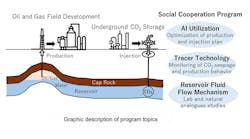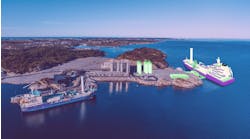O&G companies already involved in half of all planned CCS projects
Editor's note: This article first appeared in the 2024 Offshore Business Strategies Special Report, which published within the May/June 2024 issue of Offshore magazine.
By Julie Copland, Elemental Energies
The EU has put carbon capture and storage (CCS) at the center of its new industrial decarbonization strategy, and this includes plans to create an EU-wide map of potential CO2 storage sites. Mature offshore oil and gas fields offer a ready-made repository for CO2; their storage capacity and characteristics have already been mapped, while existing wells and pipelines can be repurposed. Yet, keeping CO2 safely and permanently underground will involve mitigating many risks from CO2 leaks and seismic events to surface uplift, involving complex well engineering.
Untapped opportunity
Annual CO2 storage needs to increase 125 times from its 2021 level of 40 mt per year to 5,000 mt per year by 2050 to achieve net zero. With global oil and gas demand projected to peak within a decade and many reservoirs reaching maturity, the International Energy Agency estimates that up to 920 gigatons of CO2 could be buried in empty or depleted oil and gas fields worldwide. The UK’s continental shelf alone has enough space to store 78 billion tonnes of CO2 equivalent to the UK’s annual CO2 emissions over two centuries.
Repurposing existing oil and gas infrastructure, such as injection wells for carbon storage, could provide an efficient and cost-effective route to scaling up global CO2 storage capacity. CO2 injection is already widely used to boost oil production by displacing oil trapped in rock pores, and the same methods could be used to inject CO2 into empty oil and gas fields. Crucially, empty fields have already been pressure depleted so CO2 could be safely stored within pressure limits.
Oil and gas fields are also attractive due to their extensive mapping, meaning their storage capacity and characteristics are well understood. As a result, the oil and gas industry is now a global leader in CCS, with oil and gas companies already involved in half of all planned CCS projects.
Mitigating risks
Yet sealing billions of tons of high-pressure CO2 underground will involve mitigating many risks; from CO2 leaks and associated groundwater contamination to potentially aging oil and gas infrastructure and corrosion. This will require major upfront work to understand the pressure limits of wells and potential corrosion risks posed by CO2 and to assess how wells might react to cyclical injection. Permanently storing CO2 will also involve monitoring and managing injection wells and CO2 reservoirs across their full lifecycle, requiring long-term joined-up thinking on a new scale for the offshore industry.
Existing expertise
Elemental Energies will be uniting more than 30 years of oil and gas well engineering expertise to drive CCS projects. The company has been leading the conceptual well design assessment for the landmark Greensand project in Denmark, which involved the first cross-border offshore CO2 storage and could bury up to 1.45 MMtonnes of CO2 annually by 2026. This includes finalizing proof of concept to convert three wells for CO2 injection, decommissioning seven, and assessing the suitability of a further three exploration wells for CO2 storage.
The project involves tackling many complex challenges including understanding the phase behavior of CO2 throughout injection and storage reactivity, the impact of multiple well startups and shutdowns on well integrity, and managing CO2 across its lifecycle.
Path forward
Storing CO2 at scale will require the adaptation of oil and gas expertise, the repurposing of existing infrastructure, and the development of new research into injection methods and technology. This will allows the industry to unlock the CCS developments needed to achieve net-zero ambitions.




